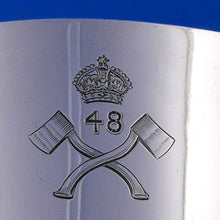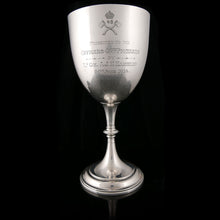The Defence of Kut - 48th Pioneers Indian Army Presentation Cup, 1913
- Regular price
- £2,400
- Sale price
- £2,400
- Regular price
-
- Unit price
- /per
Adding product to your cart
Height: 20.5cm (in)
Provenance: Lieutenant-Colonel C.A. Rayner, DSO, MC, 9th Jats, late 48th Bombay Pioneers, Indian Army
Silver. A George V goblet with spreading stepped foot rising to a stem with beaded knop supporting the bowl engraved ‘Presented to the Officers 48th Pioneers by Lt.Col. A.J.N. Harward, 24th June 1914’. Maker’s name of Elkington & Co. Ltd. Hallmarked 1913.
The date inscribed on the present cup marks the appointment of its donor Colonel Arthur John Netherton Harward (1867-1930) as commanding officer of the 48th Pioneers. To some extent the cup may be seen as a token of a battalion that all but ceased to exist through its campaigning in Mesopotamia in 1914-16.
The custodian of this cup in later years, Lieutenant-Colonel Cyril Raynor, DSO, MC (1889-1973), was born at Lahore, British India. He was commissioned in 1909 and appointed to the 48th Pioneers in 1910. At the outbreak of the First World War he was a subaltern with the regiment at Kirkee when it was ordered to Bombay and thence by ship to Mesopotamia to assist the 6th (Poona) Division safeguard British oil installations near Basra. The Pioneers landed on 15 November 1914 and next day received a baptism of fire at Zahil where they suffered 90 casualties. The day after that Colonel Harward was ‘ ‘on the mat’ before the G.O.C. for having had so many casualties whilst his battalion was only in reserve’.
After a period repairing roads and building defences at Kurna and Basra, the Pioneers were in action again at Shaiba on 12-14 April 1915. After Shaiba and in pursuit of a forward defence policy, it was decided to clear the eastern flank of the expeditionary force’s advance towards Baghdad. Owing to a shortage of Pioneers, Raynor was detached with No.4 Company to provide a combat engineering capability. In the fight at Kafiajiyeh, Raynor’s company formed the vanguard of one column, and carried out its customary bridging and demolition operations. The troops suffered from the heat, lack of water and long desert marches, but operations were completely successful and No.4 Company arrived back at Basra after seven weeks. Raynor was then seconded to the staff of the Indian Expeditionary Force D commander General Sir J. Nixon.
The 6th (Poona) Division next attempted the capture Baghdad but was stopped after three days of fighting at the Battle of Ctesiphon (22-25 November 1915). By this time the 48th were providing detachments for guard duties leaving Colonel Harward, only six British Officers, 10 Indian Officers and 461 men to make a ‘preparatory frontal attack’ as part of a wider assault against the Turkish lines. The Pioneers suffered accordingly but prevailed to the extent that ‘The survivors of the 48th, led on by Colonel Harward, penetrated through several lines of support trenches and then opened up at the Turks retreating.’ In the process the 48th captured four field guns but being unable to move them, ‘Colonel Harward personally removed the four breechblocks and had them buried’.
By the end of 24 November both sides were exhausted and had suffered severe losses. In the Pioneers Colonel Harward was among 277 casualties, a 57% casualty rate. The 6th (Poona) Division then fell back to Kut-al-Amara where it was besieged between December 1915 and April 1916. On Christmas Eve 1915 the Turks commenced their one serious attempt to capture Kut by storm, their main effort being against the Fort. Here Raynor proved himself once again. The History of the Bombay Pioneers continues ‘About 11 p.m. the 48th Pioneers — about two hundred strong reinforced the stockade … The 48th Pioneers at once became involved in a stiff fight and the greater part of the first thirty of them to man the stockade were either killed or wounded, including their commanding officer Captain Newman. But other Pioneers, under Lieut. Raynor, took their place and gallantly defeated all Turkish efforts to get over or round the stockade, and their action finally turned the scale. The Turkish attacks began to weaken and then finally about midnight the Turkish infantry withdrew.’
At the end of April 1916, after failed relief efforts and with the 6,500 strong Kut garrison starving, General Townsend, commanding 6th (Poona) Division prepared to surrender. T. E. Lawrence and a team of officers offered the Turks £2 million for Townshend's troops with the promise those soldiers would not fight the Ottomans again. Enver Pasha at first pretended to negotiate in good faith, then publicized and rejected the offer as a final humiliation to the British when the Division surrendered. Over 300 officers and men of the 48th Pioneers went into captivity when the town fell but only 90 men returned to India after the war due to the barbaric treatment they received in at the hands of the Turks.
Raynor transferred to the 9th Jats after the war and in 1919 was awarded the Distinguished Service Order for services at Kut in addition to the Military Cross awarded in 1917. Colonel Harward’s service singled out for special praise.
‘The KING has been graciously pleased to give orders for the following] appointment to the Most Honourable Order of the Bath for valuable services rendered in connection with the defence of Kut-al Amarah.* Dated 3rd June, 1919:— To be an Additional Member of the Military Division of the Third Class, or Companion, of the said Most Honourable Order:—Lt.-Col. & Bt. Col. Arthur John Netherton Harward, 48th Pnrs., Ind. Army.’ His medals are in the National Army Museum, Chelsea.




